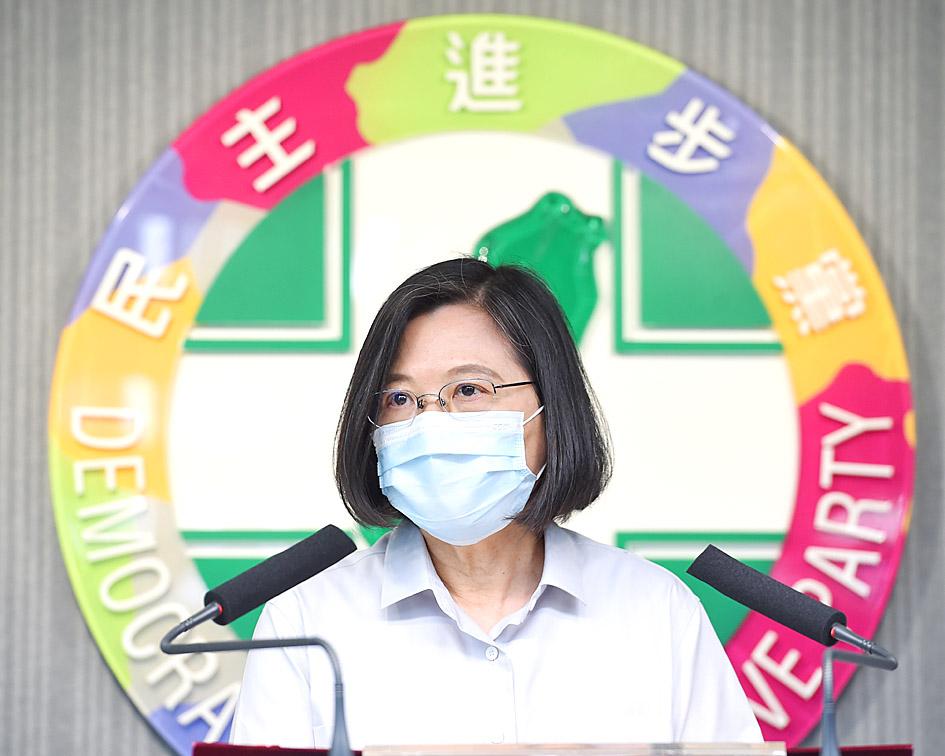President Tsai Ing-wen (蔡英文) on Wednesday offered a public apology, following media reports of a Democratic Progressive Party (DPP) member being affiliated with an organized crime group, and said that the party would tighten its review mechanism to screen out unqualified people.
“In recent days, reports on gang activities and crime have been linked to the DPP’s internal management of party membership. These have led to criticism and have tarnished our party’s image,” said Tsai, who is also the DPP chairperson, at the party’s headquarters in Taipei.
“The DPP failed to fully implement the party’s clause on prohibiting gang-affiliated people from becoming a party member, which has led to controversies and disappointed our supporters. I apologize for this,” she added.

Photo: Liu Hsin-de, Taipei Times
Tsai was referring to the case involving Chao Ying-kuang (趙映光), convener of the DPP Taipei chapter’s review committee, who resigned last week, following reports about his son Chao Chieh-yu (趙介佑), who is under investigation for racketeering, assault and kidnapping related to an organized crime group based in Taipei’s Beitou District (北投).
The DPP in 2013 added a clause to its charter that says it will not allow people to apply for party membership if they are convicted of breaching the Organized Crime Prevention Act (組織犯罪防制條例), the Narcotics Hazard Prevention Act (毒品危害防制條例), or the Controlling Guns, Ammunition and Knives Act (槍砲彈藥刀械管制條例).
“In the coming days, the DPP will institute a new system for background checks, and check court ruling records and other open information platforms. Regular checks will be conducted on new members, and party candidates running in elections, and will assess their performance when they are elected to public office. These will also remove those found to be affiliated with organized crime groups,” Tsai said.
The party will make use of an artificial intelligence (AI) information system to prevent members of organized crime groups from joining the party, DPP secretary-general Lin Hsi-yao (林錫耀) said.
Taiwan People’s Party Legislator Ann Kao (高虹安), known for her specialty in digital technology, yesterday praised the DPP for its efforts, but added that technology alone would not help the party deal with the problem of infiltration by organized crime.
“AI is mainly utilized to analyze large amounts of data and to extract useful information. Making a model requires a supply of materials and markers from which patterns and definitions could be derived,” she wrote on Facebook.
“Introducing AI might help with the technical issues involved in the evaluation [of party members], but a political party must depend on the innate wisdom of humans for its core values and standards of conduct,” she said.
“Politics is the work of human beings governing other human beings,” Kao said.
“The DPP has had the rule to exclude gang members for a very long time; the rule failed because its users did not put their minds to implement it,” she said.

CAUTION: Based on intelligence from the nation’s security agencies, MOFA has cautioned Taiwanese travelers about heightened safety risks in China-friendly countries The Ministry of Foreign Affairs (MOFA) yesterday urged Taiwanese to be aware of their safety when traveling abroad, especially in countries that are friendly to China. China in June last year issued 22 guidelines that allow its courts to try in absentia and sentence to death so-called “diehard” Taiwanese independence activists, even though Chinese courts have no jurisdiction in Taiwan. Late last month, a senior Chinese official gave closed-door instructions to state security units to implement the guidelines in countries friendly to China, a government memo and a senior Taiwan security official said, based on information gathered by Taiwan’s intelligence agency. The

The National Immigration Agency (NIA) said yesterday that it will revoke the dependent-based residence permit of a Chinese social media influencer who reportedly “openly advocated for [China’s] unification through military force” with Taiwan. The Chinese national, identified by her surname Liu (劉), will have her residence permit revoked in accordance with Article 14 of the “Measures for the permission of family- based residence, long-term residence and settlement of people from the Mainland Area in the Taiwan Area,” the NIA said in a news release. The agency explained it received reports that Liu made “unifying Taiwan through military force” statements on her online

Taiwan Semiconductor Manufacturing Co (TSMC), the world’s largest contract chipmaker, said yesterday that it is looking to hire 8,000 people this year, at a time when the tech giant is expanding production capacity to maintain its lead over competitors. To attract talent, TSMC would launch a large-scale recruitment campaign on campuses across Taiwan, where a newly recruited engineer with a master’s degree could expect to receive an average salary of NT$2.2 million (US$60,912), which is much higher than the 2023 national average of NT$709,000 for those in the same category, according to government statistics. TSMC, which accounted for more than 60 percent

A magnitude 5.7 earthquake struck off Taitung County at 1:09pm today, the Central Weather Administration (CWA) said. The hypocenter was 53km northeast of Taitung County Hall at a depth of 12.5km, CWA data showed. The intensity of the quake, which gauges the actual effect of a seismic event, measured 4 in Taitung County and Hualien County on Taiwan's seven-tier intensity scale, the data showed. The quake had an intensity of 3 in Nantou County, Chiayi County, Yunlin County, Kaohsiung and Tainan, the data showed. There were no immediate reports of damage following the quake.